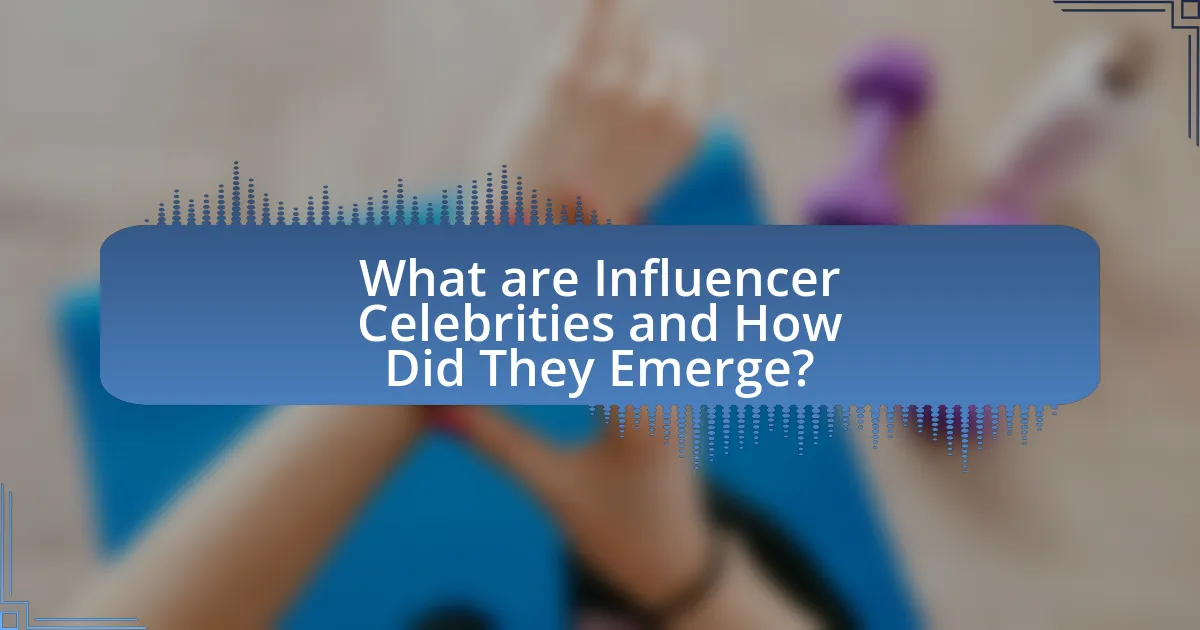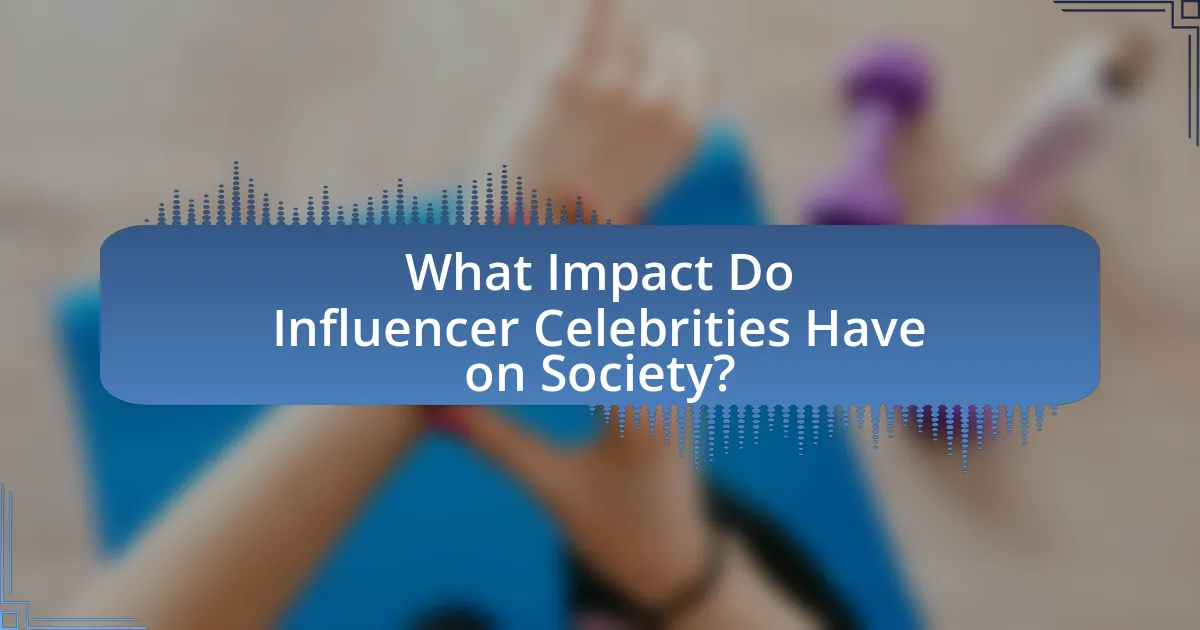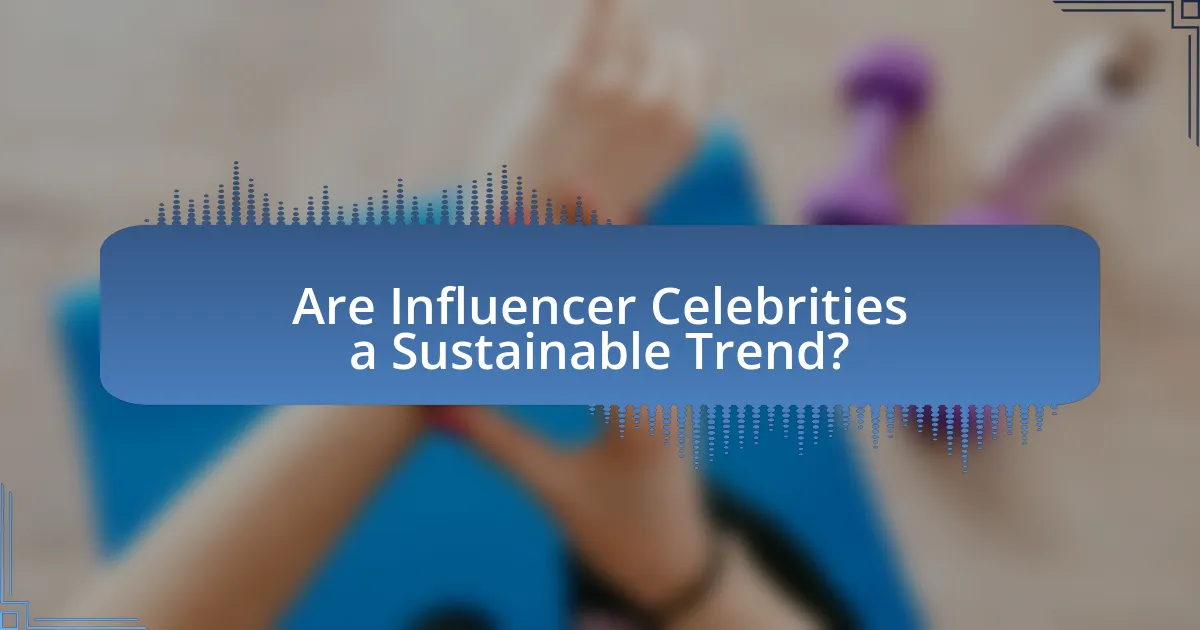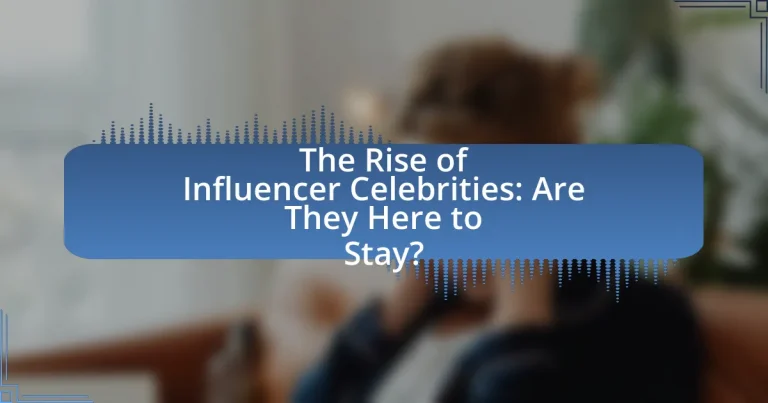Influencer celebrities are individuals who utilize social media platforms to build substantial followings and influence consumer behavior through their content. This article explores the emergence of influencer celebrities, their defining characteristics, and how they differ from traditional celebrities. It examines the platforms that amplify their reach, the factors contributing to their rise, and their significant impact on consumer behavior and societal norms. Additionally, the article addresses the challenges influencer celebrities face regarding mental health, public scrutiny, and the sustainability of their careers in an evolving digital landscape.

What are Influencer Celebrities and How Did They Emerge?
Influencer celebrities are individuals who leverage social media platforms to build a substantial following and influence consumer behavior through their content. They emerged in the early 2000s with the rise of platforms like YouTube, Instagram, and later TikTok, where users began sharing personal experiences, lifestyle choices, and product endorsements, effectively transforming their online presence into a brand. The phenomenon gained traction as brands recognized the potential of these influencers to reach targeted audiences more authentically than traditional advertising methods, leading to a significant shift in marketing strategies. By 2021, the influencer marketing industry was valued at approximately $13.8 billion, highlighting their impact on consumer culture and brand engagement.
What defines an influencer celebrity?
An influencer celebrity is defined as an individual who has gained fame and recognition primarily through social media platforms, leveraging their online presence to impact and engage audiences. These individuals often possess a substantial following, which they utilize to promote products, brands, or lifestyles, effectively blurring the lines between traditional celebrity and digital influencer. For instance, according to a 2021 report by Statista, influencers with over one million followers can earn between $10,000 to $100,000 per sponsored post, highlighting their significant market influence and the economic power they wield in the digital landscape.
How do influencer celebrities differ from traditional celebrities?
Influencer celebrities differ from traditional celebrities primarily in their mode of engagement and the platforms they utilize. Influencer celebrities often build their fame through social media channels, directly interacting with their audience, which fosters a sense of community and relatability. In contrast, traditional celebrities typically gain recognition through mainstream media such as television, film, and music, where their interactions with fans are more mediated and less personal.
For example, a study by the Pew Research Center in 2021 found that 72% of teenagers in the U.S. reported being influenced by social media personalities, highlighting the significant impact influencers have on younger demographics compared to traditional celebrities. This shift indicates a transformation in how fame is constructed and maintained in the digital age.
What platforms are most influential for these celebrities?
The most influential platforms for celebrities are Instagram, TikTok, and YouTube. Instagram is widely recognized for its visual appeal and engagement, making it a primary platform for influencers to connect with their audience through photos and stories. TikTok has rapidly gained popularity due to its short-form video content, allowing celebrities to reach younger demographics effectively. YouTube remains a powerful platform for long-form content, enabling celebrities to showcase their personalities and talents in depth. According to a 2023 report by Statista, Instagram has over 1.4 billion monthly active users, TikTok has surpassed 1 billion, and YouTube boasts over 2 billion users, highlighting their significant influence in the celebrity landscape.
What factors contributed to the rise of influencer celebrities?
The rise of influencer celebrities is primarily attributed to the proliferation of social media platforms, which provide a direct channel for individuals to connect with large audiences. Social media’s accessibility allows anyone to create and share content, leading to the democratization of fame. Additionally, the shift in consumer behavior towards valuing authenticity and relatability has made influencers appealing, as they often present themselves as everyday individuals rather than traditional celebrities. According to a 2021 survey by the Digital Marketing Institute, 49% of consumers rely on influencer recommendations, highlighting their impact on purchasing decisions. This combination of platform accessibility and changing consumer preferences has significantly contributed to the emergence and popularity of influencer celebrities.
How has social media changed the landscape of celebrity culture?
Social media has fundamentally transformed celebrity culture by enabling direct interaction between celebrities and their fans. This shift allows celebrities to cultivate personal brands and engage with audiences in real-time, bypassing traditional media gatekeepers. For instance, platforms like Instagram and Twitter have given rise to influencer celebrities who often have larger followings than traditional stars, demonstrating the power of social media in shaping public perception and popularity. According to a 2021 study by the Pew Research Center, 72% of teens reported using Instagram, highlighting its role in influencing youth culture and celebrity status. This direct engagement fosters a sense of intimacy and accessibility, altering how fame is perceived and achieved in contemporary society.
What role do audience engagement and authenticity play in their rise?
Audience engagement and authenticity are crucial in the rise of influencer celebrities, as they foster trust and loyalty among followers. High levels of audience engagement, characterized by likes, comments, and shares, indicate that influencers effectively connect with their audience, leading to increased visibility and influence. Authenticity, defined as genuine and relatable content, enhances this connection, as studies show that 86% of consumers value authenticity in brand communication. This combination of engagement and authenticity not only drives follower growth but also translates into higher conversion rates for brands, solidifying the influencer’s role in modern marketing strategies.

What Impact Do Influencer Celebrities Have on Society?
Influencer celebrities significantly shape societal norms and consumer behavior. Their ability to reach large audiences through social media platforms allows them to influence trends, promote products, and shape public opinion. For instance, a study by the Digital Marketing Institute found that 49% of consumers depend on influencer recommendations when making purchasing decisions, highlighting their impact on consumer trust and brand loyalty. Additionally, influencer celebrities often address social issues, raising awareness and driving conversations around topics like mental health, sustainability, and diversity, which can lead to societal change.
How do influencer celebrities influence consumer behavior?
Influencer celebrities significantly influence consumer behavior by leveraging their social media presence to shape perceptions and drive purchasing decisions. Their ability to create relatable content and establish trust with followers leads to increased brand awareness and consumer engagement. For instance, a study by the Digital Marketing Institute found that 49% of consumers depend on influencer recommendations when making purchase decisions, highlighting the effectiveness of influencer marketing. Additionally, influencer endorsements can lead to a 10 times higher return on investment compared to traditional advertising methods, demonstrating their impact on consumer behavior.
What types of products are most commonly promoted by influencer celebrities?
Influencer celebrities most commonly promote beauty products, fashion items, health and wellness products, and lifestyle brands. According to a 2021 survey by Influencer Marketing Hub, 63% of influencers reported that beauty and fashion were the top categories for brand partnerships, highlighting the significant market presence of these products in influencer marketing. Additionally, the health and wellness sector has seen a rise in promotions, with influencers endorsing supplements and fitness programs, reflecting consumer interest in personal well-being.
How do influencer endorsements affect brand perception?
Influencer endorsements significantly enhance brand perception by leveraging the trust and relatability that influencers have with their audiences. Research indicates that 49% of consumers depend on influencer recommendations when making purchasing decisions, demonstrating the powerful impact influencers have on shaping consumer attitudes towards brands. Additionally, a study published in the Journal of Advertising Research found that brands endorsed by influencers are perceived as more authentic and credible, leading to increased brand loyalty and positive consumer sentiment. This correlation between influencer endorsements and improved brand perception underscores the effectiveness of influencer marketing in today’s digital landscape.
What are the social implications of influencer celebrity culture?
Influencer celebrity culture significantly impacts social dynamics by shaping consumer behavior, altering perceptions of success, and influencing social norms. This culture promotes a lifestyle that prioritizes visibility and engagement over traditional achievements, leading to a shift in how individuals define success. For instance, a study by the Pew Research Center found that 72% of teenagers feel pressure to appear popular on social media, indicating that influencer culture can create unrealistic standards and expectations. Additionally, influencers often drive trends and consumerism, with a report from Business Insider revealing that 49% of consumers rely on influencer recommendations for purchasing decisions. This reliance can lead to a homogenization of tastes and values, as followers may adopt the lifestyles and preferences of influencers rather than developing their own.
How do influencer celebrities shape trends and societal norms?
Influencer celebrities shape trends and societal norms by leveraging their large followings on social media platforms to promote products, lifestyles, and ideologies. Their ability to connect with audiences creates a powerful influence that can drive consumer behavior and shift cultural perceptions. For instance, a study by the Digital Marketing Institute found that 49% of consumers depend on influencer recommendations for their purchasing decisions, highlighting the significant impact these figures have on market trends. Additionally, influencer celebrities often set standards for beauty, fashion, and social issues, which can lead to widespread adoption of new norms, as seen in movements like body positivity and sustainable fashion.
What challenges do they face regarding mental health and public scrutiny?
Influencer celebrities face significant challenges regarding mental health and public scrutiny, primarily due to constant exposure to criticism and unrealistic expectations. This relentless public attention can lead to anxiety, depression, and burnout, as influencers often feel pressured to maintain a perfect image and engage with their audience continuously. Research indicates that 70% of influencers report experiencing mental health issues related to their online presence, highlighting the psychological toll of public scrutiny. Additionally, the fear of negative feedback can exacerbate feelings of inadequacy and isolation, making it difficult for them to seek help or express vulnerability.

Are Influencer Celebrities a Sustainable Trend?
Influencer celebrities are not a sustainable trend. The rapid evolution of social media platforms and changing consumer preferences indicate that reliance on influencer marketing may diminish over time. For instance, a 2022 study by HubSpot found that 63% of consumers believe influencer marketing is becoming oversaturated, suggesting a decline in effectiveness. Additionally, the rise of artificial intelligence and automated content creation poses a threat to the authenticity that influencer celebrities rely on, further questioning their long-term viability.
What challenges threaten the longevity of influencer celebrities?
Influencer celebrities face several challenges that threaten their longevity, including market saturation, changing algorithms, and evolving audience preferences. Market saturation occurs as more individuals enter the influencer space, making it difficult for established influencers to maintain their unique appeal. Changing algorithms on social media platforms can drastically affect visibility and engagement, as seen with Instagram’s shift towards prioritizing video content over static images. Additionally, audience preferences are constantly evolving, with consumers increasingly seeking authenticity and relatability, which can lead to a decline in follower loyalty for influencers who fail to adapt. These factors collectively contribute to the instability of influencer careers in a rapidly changing digital landscape.
How does audience fatigue impact influencer relevance?
Audience fatigue significantly diminishes influencer relevance by reducing engagement levels and audience trust. When audiences are repeatedly exposed to similar content from influencers, they may become desensitized, leading to decreased interaction and interest. Research indicates that 60% of consumers feel overwhelmed by the amount of content they encounter, which can result in a decline in the perceived authenticity of influencers. This decline in authenticity directly affects their ability to influence purchasing decisions, as audiences are less likely to trust influencers who appear to be promoting products solely for financial gain rather than genuine interest.
What regulatory changes could affect influencer marketing?
Regulatory changes that could affect influencer marketing include stricter guidelines on disclosure requirements for sponsored content. The Federal Trade Commission (FTC) in the United States has emphasized the need for influencers to clearly disclose paid partnerships to ensure transparency for consumers. In 2021, the FTC updated its guidelines, stating that influencers must use clear and conspicuous language when indicating that a post is sponsored, which could lead to increased scrutiny and potential penalties for non-compliance. Additionally, the European Union’s Digital Services Act aims to regulate online platforms, which may impose further obligations on influencers regarding content moderation and advertising practices. These regulatory shifts are designed to protect consumers and promote fair advertising practices in the influencer marketing space.
What strategies can influencer celebrities adopt to remain relevant?
Influencer celebrities can remain relevant by consistently engaging with their audience through authentic content and adapting to emerging trends. Engaging with followers fosters a sense of community, which is crucial for maintaining loyalty. For instance, a study by the Digital Marketing Institute found that 70% of consumers feel more connected to brands when they see relatable content. Additionally, influencer celebrities should diversify their platforms, utilizing emerging social media channels like TikTok or Clubhouse, which can reach younger demographics. According to Statista, TikTok had over 1 billion active users as of 2021, indicating a significant opportunity for influencers to expand their reach. Lastly, collaborating with other influencers or brands can introduce them to new audiences, enhancing their visibility and relevance in a competitive landscape.
How can influencer celebrities diversify their content and platforms?
Influencer celebrities can diversify their content and platforms by exploring various media formats and engaging with different audience demographics. For instance, they can create video content on platforms like YouTube and TikTok, while also maintaining a presence on Instagram and Twitter for photo and text-based updates. Additionally, they can collaborate with brands across different industries, participate in podcasts, and host live events to reach broader audiences. Research indicates that influencers who utilize multiple platforms can increase their follower engagement by up to 30%, demonstrating the effectiveness of a diversified approach.
What role does collaboration with brands play in their sustainability?
Collaboration with brands significantly enhances sustainability by leveraging shared resources and expertise to promote eco-friendly practices. When influencers partner with brands committed to sustainability, they amplify awareness and drive consumer behavior towards environmentally responsible choices. For instance, a study by the Harvard Business Review found that brands engaging in sustainable collaborations can increase their market share by up to 20%, demonstrating the tangible benefits of such partnerships. This synergy not only fosters innovation in sustainable product development but also encourages transparency and accountability in supply chains, ultimately contributing to a more sustainable economy.
What are the best practices for aspiring influencer celebrities?
Aspiring influencer celebrities should focus on building a strong personal brand, engaging authentically with their audience, and consistently creating high-quality content. Establishing a unique identity helps differentiate them in a crowded market, while authentic engagement fosters trust and loyalty among followers. Consistent, high-quality content not only attracts viewers but also encourages sharing, which can lead to increased visibility and growth. According to a study by the Digital Marketing Institute, 70% of consumers prefer to learn about products through content rather than traditional advertising, highlighting the importance of effective content creation for influencers.
How can they build an authentic personal brand?
To build an authentic personal brand, individuals should focus on clearly defining their unique values and passions, which serve as the foundation of their brand identity. This involves self-reflection to understand what they stand for and how they want to be perceived by their audience. Consistency in messaging and visuals across all platforms reinforces authenticity, as seen in successful influencers who maintain a cohesive aesthetic and voice. Engaging genuinely with their audience through transparent communication and storytelling fosters trust, which is crucial for brand loyalty. Research indicates that 86% of consumers value authenticity in brands, highlighting the importance of being true to oneself in personal branding efforts.
What strategies should they use to engage with their audience effectively?
To engage with their audience effectively, influencer celebrities should utilize authentic storytelling and interactive content. Authentic storytelling fosters a genuine connection, as audiences are more likely to relate to personal experiences and narratives. For instance, a study by the Digital Marketing Institute found that 70% of consumers prefer to learn about products through content rather than traditional advertising, highlighting the effectiveness of storytelling in engagement.
Additionally, incorporating interactive content such as polls, Q&A sessions, and live streams encourages audience participation, making followers feel valued and involved. Research from HubSpot indicates that interactive content generates twice the engagement of passive content, further supporting the strategy of interaction for effective audience engagement.


